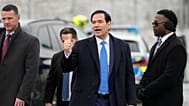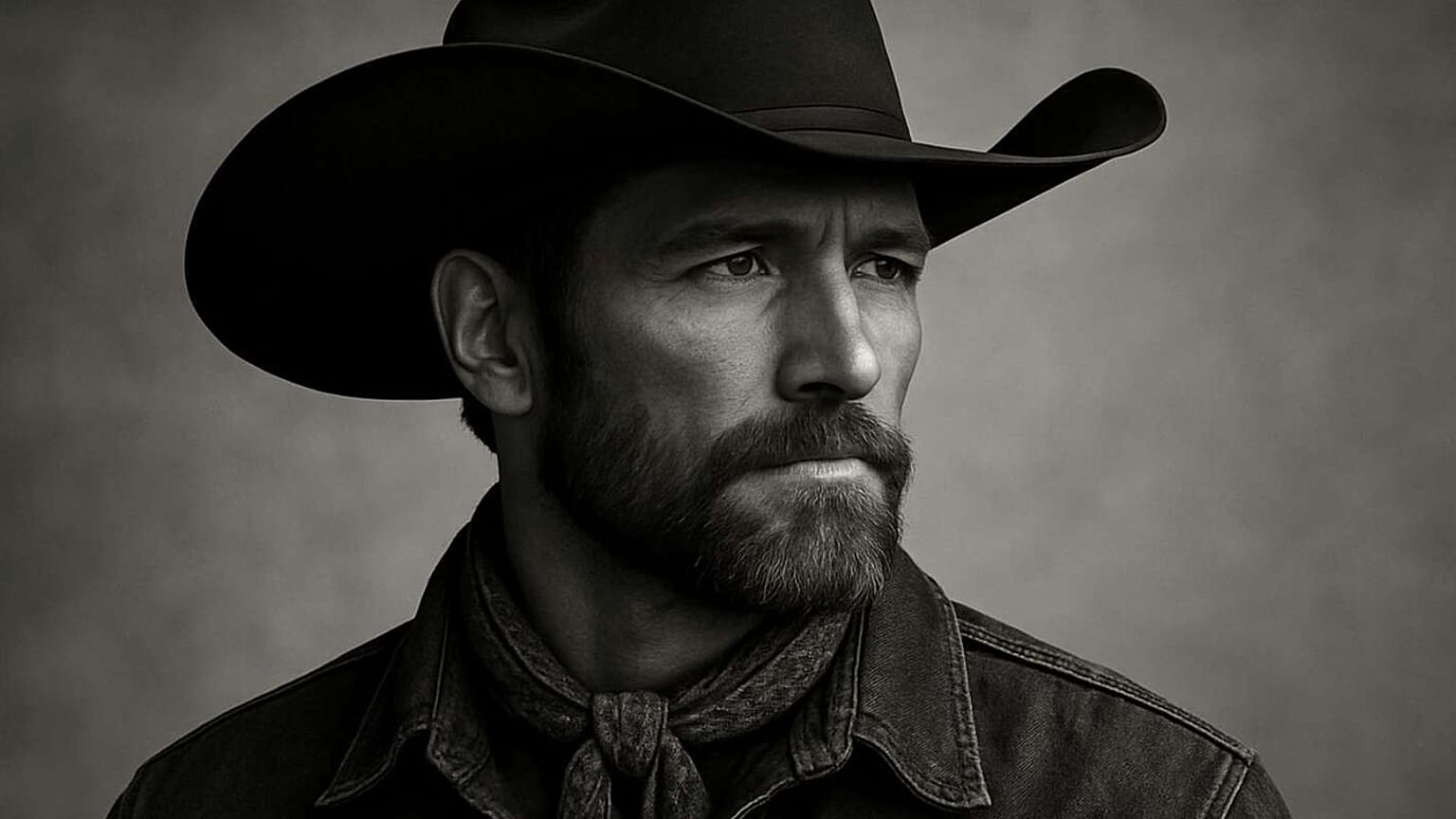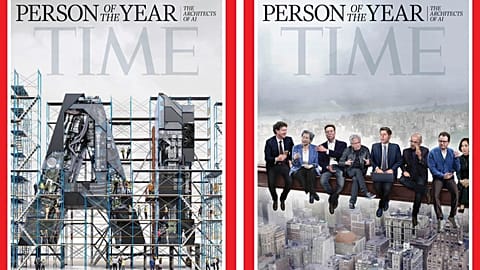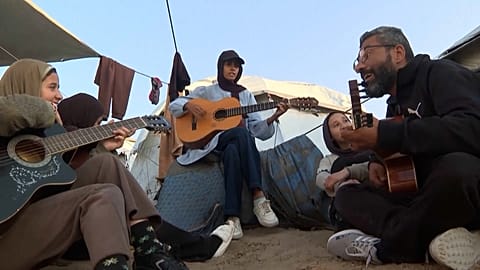An AI-generated music persona has topped the US Billboard charts for the first time, at the same time as a “first-of-its-kind" study from French streaming service Deezer reveals that 97 per cent of people “can’t tell the difference” between real music and AI-generated music.
It’s a first, and not one worth celebrating.
 ADVERTISEMENT
ADVERTISEMENT
 ADVERTISEMENT
ADVERTISEMENT
A song generated by artificial intelligence has topped the charts in the US for the first time, as a country “artist” named Breaking Rust has landed the Number 1 spot on Billboard’s Country Digital Song Sales chart.
The viral track, ‘Walk My Walk’, has over 3.5 million streams on Spotify - a platform on which “he” is a verified artist and which has prior form when it comes to giving AI-generated bands a platform.
Other Breaking Rust songs like ‘Livin’ on Borrowed Time’ and ‘Whiskey Don’t Talk Back’ have amassed more than 4 million and 1 million streams respectively. And if you just cringed your way into a mild aneurysm when reading that last song title, you’re only human.
Not all that much is known about Breaking Rust, apart from “his” nearly 43,000 followers on Instagram and a Linktree bio that reads: “Music for the fighters and the dreamers.”
How profound.
Any gluttons for clichéd dross who choose to head to the Instagram page will find several generic AI-generated videos of stubbly cowboys looking like factory-reject Ben Afflecks walking on snow-covered train tracks, lifting weights and holding their hats under the rain. In other words, stereotypical Outlaw Country fantasies that reek of fragile masculinity and necktie fetishes.
Still, fans are clearly loving it, seemingly unbothered that the “Soul Music for Us” glaringly lacks, you know, a soul.
“Love your voice! Awesome song writing! I want more” reads one comment on a video, while another writes: “I don’t know if this is a real guy but his songs are seriously some of my favorite in life.”
“I LIKE THE SONG, NO MATTER WHO CREATED IT!” screams one comment on YouTube.
Some listeners also appear not to realize that Breaking Rust isn’t human, as fans are complimenting the lyricism (strewth!) and even asking the “artist” go on tour.
This is not the first time that an AI-generated act has debuted on Billboard’s charts. One notable example is Xania Monet, who made headlines in September when the tracks ‘Let Go, Let Go’ climbed to No.3 (Gospel) and ‘How Was I Supposed To Kow’ peaked at No. 20 (R&B).
Created by Telisha “Nikki” Jones using the AI platform Suno, Monet has been a particularly visible AI “artist” – one which even triggered a bidding war to sign “her”. Hallwood Media, led by former Interscope executive Neil Jacobson, ultimately won and signed Monet to a reported multimillion-dollar deal.
Who knows whether the same will happen for Breaking Rust, but the chart-topping success does signal a continuing shift in the music industry.
There have been concerns about the use of generative AI in all creative sectors – from Hollywood with the writer and actor guild strikes and the creation of the so-called AI actress Tilly Norwood to the recent internet meltdown over Coca-Cola making their Christmas adverts entirely AI-generated. And the more AI-created bands and musicians continue to proliferate, the more real human artists will struggle to break through – let alone generate revenues from their craft.
As Josh Antonuccio, director of the School of Media Arts and Studies at Ohio University, recently told Newsweek: “Whether it’s lyrical assistance, AI-assisted ideation, or wholesale artist and song creation, AI-generated content is going to become a much more common reality and will continue to find its way into the charts.”
He added: “The real question starts to become 'will fans care about how it’s made?'”
Indeed, the success of Breaking Rust comes as a new, “first-of-its-kind" study has found that 97 per cent of people “can’t tell the difference” between real music and AI-generated music.
The survey, conducted by French streaming service Deezer and research firm Ipsos, asked around 9,000 people from eight different countries (Brazil, Canada, France, Germany, Japan, the Netherlands, the UK and the US) to listen to three tracks to determine which was fully AI-generated.
According to the report, 97 per cent of those respondents “failed” - with 52 per cent saying they felt “uncomfortable” to not know the difference.
The study also found that 55 per cent of respondents were “curious” about AI-generated music, and that 66 per cent said they would listen to it at least once, out of curiosity.
However, only 19 per cent said they felt that they could trust AI, while another 51 per cent said they believe the use of AI in music production could lead to “generic” sounding music.
“The survey results clearly show that people care about music and want to know if they’re listening to AI or human made tracks or not,” said Alexis Lanternier, CEO of Deezer. “There’s also no doubt that there are concerns about how AI-generated music will affect the livelihood of artists, music creation and that AI companies shouldn’t be allowed to train their models on copyrighted material.”
Earlier this year, artists including Paul McCartney, Kate Bush, Dua Lipa and Elton John urged UK Prime Minister Keir Starmer to protect the work of creatives, with Sir Elton posting a statement saying that “creative copyright is the lifeblood of the creative industries”. He added that government proposals which let AI companies train their systems on copyright-protected work without permission left the door “wide open for an artist’s life work to be stolen.”
Sir Elton previously claimed that AI would “dilute and threaten young artists’ earnings”, a statement backed by thousands of real-life artists who continue to petition the music industry to implement safeguards related to artificial intelligence and copyright.
In February, more than 1,000 artists, including Annie Lennox, Damon Albarn and Radiohead, launched a silent album titled 'Is This What We Want?', in protest against UK government plans that could allow AI companies to use copyrighted content without consent.
The album, featuring the sounds of empty studios and performance spaces, was designed to be a symbol of the negative impact controversial government proposals could have on musicians' livelihoods.
Kate Bush, one of the leading voices in the protest, expressed her concerns by saying: "In the music of the future, will our voices go unheard?"
The question still stands and feels more urgent than ever, considering the chart-topping sounds of Breaking Rust.
Give us empty studio sounds over soulless cowboy platitudes any day of the week.

















